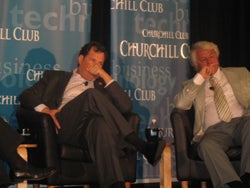MOUNTAIN VIEW, Calif. – The final score: Benioff, 5 runs, 14 hits, 2 errors, 3 walks; Plattner, 4 runs, 9 hits, 3 errors and one hit batsman.
Or thereabouts.
If any of those in attendance here last night for the “Great Debate: The Future of Enterprise Software” had brought a scorecard it would have filled up rapidly. Perhaps it wasn’t a debate for the ages, but the Computer History Museum seemed an appropriate spot for the two software sluggers to try and go deep.
Salesforce.com CEO Marc Benioff and SAP Chairman and co-founder Hasso Plattner went at it pretty good for about an hour and a half before a packed ballroom of industry insiders, venture capitalists and computer execs. At one point, the brash Benioff even tried to convince Plattner to develop SAP’s SaaS projects on the Salesforce platform.
Perhaps that wasn’t surprising given the stakes. Both companies are battling for a bigger piece of the $250 billion enterprise software market. But this debate was as much about old versus new, established versus upstart as it was about market share.
 |
Marc Beniof (L) and Hasso Plattner consider a question during their spirited debate. Photo: Dave Needle |
Benioff seemed to score the most points as he hammered on the theme that the old on-premises model of software long championed by companies like SAP, Oracle, IBM and Microsoft, has had its day.
Plattner’s responses were generally more measured, readily conceding there was value in the SaaS
Plattner said over 2,500 developers were working on SAP’s on-demand software. “There’s no question it’s technically possible to run large parts of an enterprise as a service,” he said. But later he said the idea of extending all operations to a SaaS model made him “scared to death.”
“Do we really want our customers’ sales volume and technical problems in an open space?” he added.
But Benioff parried that by noting Salesforce has plenty of enterprise customers, had beat SAP in winning an account with DuPont and has other large customers such as Cisco (NASDAQ:CSCO).
Plattner admitted SAP lost DuPont because its CRM offering at the time wasn’t competitive, but he claimed a major software company recently chose SAP over Salesforce to run unspecified parts of its operation. Pressed, Plattner said he would get in trouble with SAP’s board if he named the software company.
While Plattner scored points in detailing the breadth of SAP’s experience, resources and developer network that now totals over 1.2 million, Benioff seemed to do a better job of framing the debate in the larger context of “the future of enterprise software”. He noted how companies like Google, Amazon, Salesforce and others are able to leverage the online model to more rapidly deliver updates and improvements as well as deal more quickly with security issues.
“The industry is moving a hundred percent to the network approach,” said Benioff.
While Microsoft is moving to a hybrid model of adding on-demand features to its legacy applications, Benioff said it’s “hanging on” to the traditional way Office is developed and deployed “because it’s their cash cow.” Conversely, he said companies like Google aren’t held back, because they don’t have the same desktop PC legacy.
Page 2 of 2
SAP on Salesforce?
Plattner said he had no problem with companies adopting solutions like Salesforce on a departmental level if it works or solves a problem, but again, he said SaaS wasn’t ready for a prime time, enterprise-wide deployment. He also said SAP found developing on-demand for the enterprise more complex than expected. Benioff was quick to offer a solution:
“I want to figure out how to get SAP on the Salesforce platform. I’m not kidding,” said Benioff. “They haven’t had a lot of success (in SaaS) and we have 41,000 customers. They need us.” As Plattner stared at the ceiling, Benioff said it would be too difficult for SAP to figure out how to move effectively to the SaaS. “There’s no way they’ll figure it out,” he said.
Plattner wasn’t buying it, but later he said if Saleforce’s Apex development language was as good as Benifoff said he’d want to check it out.
 |
Benioff (L) and Plattner (R) Source: Dave Needle |
Benioff admitted the SaaS model isn’t infallible. Salesforce, for example, has had outages on occasion that made its software inaccessible. Then, turning that negative into a positive, he said, “no one has a hundred percent uptime, but we have transparency (with our customers). On-demand is like a marriage, it’s not a one night stand like most enterprise software is where they drop off the CD and say good luck.”
Of course Plattner disagreed with that appraisal and pointed to SAP’s customer successes.
The difference between the two firm’s approaches came into sharp focus during the Q&A session. An audience member, identified as a CIO and SAP customer, said he wasn’t interested in all the talk about platforms and technologies, but solutions.
He said the Salesforce model is appealing because of the ease of plugging in different on-demand solutions. He also liked and needs the end-to-end support SAP provides to run his business, but feels it’s too closed.
Plattner suggested he needed to upgrade to a newer version of SAP to get more features and flexibility. Benioff said with Salesforce, new features come free as part of the standard subscription price instead of a major upgrade cost.
But the evening ended on a conciliatory note, as both executives were asked to name what they admired about the other. Benioff said he had great respect for Plattner’s tenure and “spectacular accomplishments through multiple paradigm shifts.”
Plattner credited Salesforce for creating a “fantastic” solution no one had thought of before.


